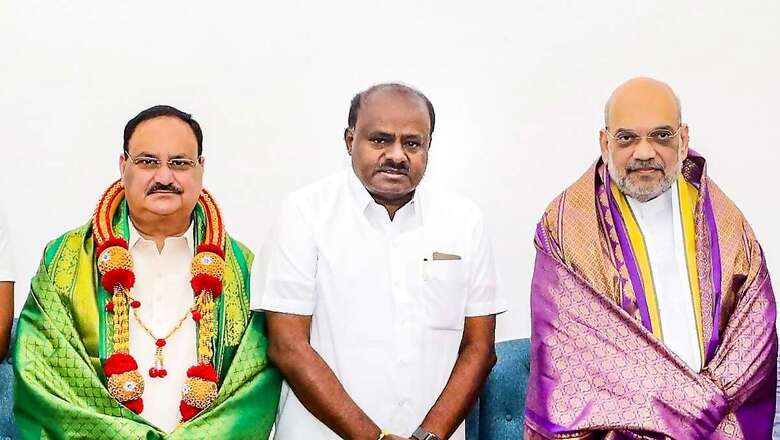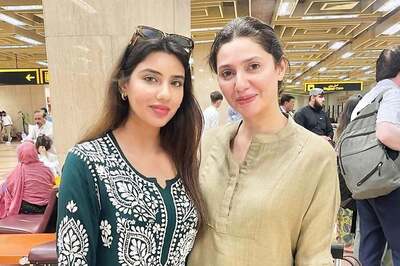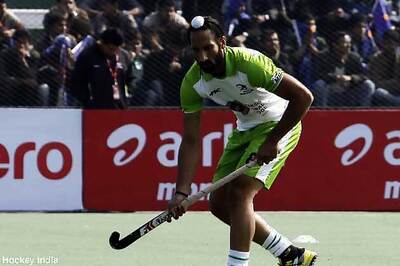
views
A few minutes after JDS leader HD Kumaraswamy met the top BJP leadership in New Delhi to cement a deal with them for the next Lok Sabha elections, someone in Karnataka joked that JDS should change its name to JDC or Janata Dal “Communal”.
Jokes apart, it was a serious statement, given that the JDS — the family party of the Gowda clan — had been questioning BJP’s “secular” credentials describing it as a “communal” party till the assembly elections in May in which JDS suffered the most humiliating defeat. The BJP had maintained a distance from the JDS after the disastrous 20:20 experiment of 2006-07, calling it the most dangerous party.
After that short-lived marriage of “communal” and “secular”, both the parties had drifted apart, often attacking each other’s political positions. The Congress, which had formed a coalition with HDK as chief minister after its defeat in the 2018 elections, used to attack JDS, calling it the B team of BJP.
During the recent assembly elections, the Congress leadership in the state often attacked the JDS, alleging a secret pact with BJP to defeat the Grand Old Party. In that most-important election, both suffered a humiliating loss and the result has brought them together to fight the ruling Congress.
Even though BJP and JDS made their alliance public on Friday, people of Karnataka were aware of the parties planning to forge a tie-up at least two months ago.
During the Monsoon session of the Assembly, it was HDK who led the attack on Congress government, relegating main opposition BJP to second place. A leaderless and rudderless BJP in the state had to swallow its pride and allow JDS to dictate terms.
With the Siddaramaiah-led Congress government in Karnataka successfully engineering a political realignment and pushing JDS to the brink, the alarmed Gowda clan has embraced BJP for its political survival.
Party patriarch and former prime minister HD Deve Gowda is 92 and not keeping well. Family members fear that in a post-Gowda scenario, JDS may not even survive. To safeguard their personal interests, they have hammered out an arrangement with the BJP. Some feel it is the first, big step towards JDS merger with the BJP in near future.
The BJP in Karnataka is yet to come out of the shock of defeat and the party bosses in New Delhi know that the local leadership won’t be able to revive the prospects of the saffron brigade on its own and getting the Gowdas on their side would be useful to mount a strong challenge to Congress in the old Mysore region where the BJP was wiped out in the May assembly elections.
The BJP ruled Karnataka twice since 2008. However, it never got majority on its own because of its inability to breach the Vokkaliga fortress of old Mysore region. Vokkaligas or Gowdas dominate about six districts in this agri-rich region.
KPCC president and Deputy Chief Minister DK Shivakumar is also a Vokkaliga and is being seen as a replacement for the Gowda clan. In the May assembly elections, DKS decimated the JDS and Congress literally swept the Vokkaliga heartland. The BJP, which polled about 8 per cent more votes in the region, failed to translate them into seats. BJP’s higher vote share finished JDS, indirectly helping the Congress.
Since they have over 50 per cent vote share together, the alliance looks formidable on paper. But two plus two is not always equal to four in politics and can lead to yet another political realignment of power.
Two dominant upper castes — Lingayats and Vokkaligas — have a long history of mutual distrust and are wary of each other. Post 1972, they came together to vote against their common enemy Congress only twice — backing the Janata Party and Dal. After the disintegration of the Janata Pariwar, Lingayats moved to the BJP and their caste man BS Yediyurappa became their leader. The Gowda caste moved with Deve Gowda’s JDS.
The Congress has managed to get a good chunk of both Lingayat and Vokkaliga votes in the last assembly elections. But it is still a party of AHINDA or Minorities, OBCs, SC/STs.
The JDS and BJP alliance might lead to a clash of upper castes and AHINDA once again in the state.
The Lingayats are upset with the BJP for trying to shake off their support and make it a multi-caste party. Given their antipathy towards the Gowda clan, they may not back the HDK-led alliance, fearing a takeover of the party by their sworn enemy.
The Vokkaliga also have their own fears. Some of them feel that backing the alliance might lead to Brahmin-Lingayat hegemony, which they detest.
Even in the state BJP, both Lingayat and Vokkaliga leaders are not enthusiastic about shaking hands with the Gowdas. The past experiences have made them bitter. The Yediyurappa faction also fears an eventual takeover of the party by the Gowdas. The Vokkaliga leaders of the BJP fear Gowdas might eclipse them completely, ending their careers.
Outside 6-8 districts of the Old Mysore region, the JDS has almost no base in the rest of Karnataka. The alliance won’t be of much use there.
The ruling Congress claims the alliance won’t be able to defeat it. Leaders, including Siddaramaiah, argue that it will collapse post the parliamentary elections.
However, they are cautious internally and fear that a big regrouping of the Gowda caste behind JDS might actually help the BJP. The severe drought and no water in the river Cauvery might also work against the ruling Congress.
Top leadership of the party, including Siddaramaiah and Shivakumar, have held a detailed discussion on the possible consequences of the alliance.
By joining hands with the BJP, the JDS has signalled a complete break from its “secular” politics and the baton of the party has been handed over to HDK and his son Nikhil Kumaraswamy, with Deve Gowda walking into the sunset.
The outcome of the Lok Sabha elections will determine the future of the alliance which, for now, looks formidable on paper.
The JDS, however, is known for its sudden political U-turns and only time will tell if there are any new turns or the alliance will last for some time.


















Comments
0 comment